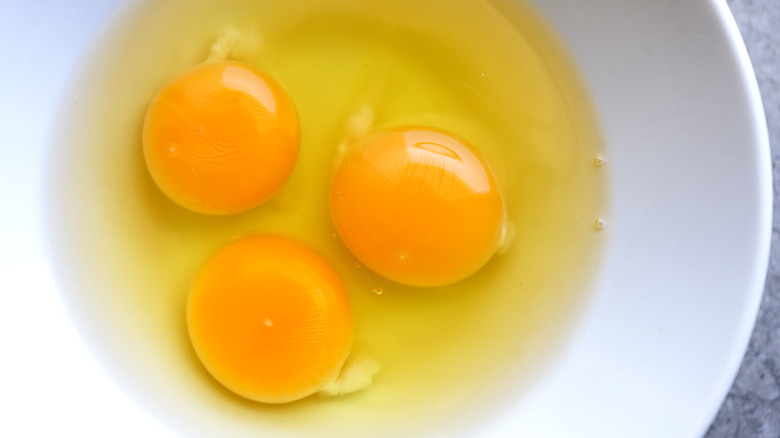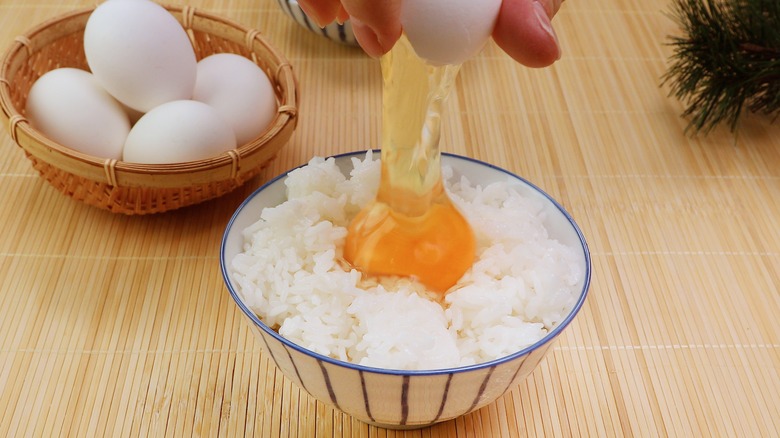Is It Safe To Eat Raw Eggs? Here's What You Should Know
If you're an athlete who enjoys gulping down a raw egg or cracking one directly into your post-workout shake, you should know about the risks that come with this instant protein source. Even if you're not a fan of drinking raw eggs, you'll also encounter them in delicious sauces like Hollandaise, mayonnaise, and aioli as well as unbaked cookie doughs, some mousses, ice creams, and egg nogs. The yummy jammy eggs in your ramen or the sunnyside-up yolk on your bibimbap are considered undercooked, too. With so many potential raw egg products around, the Centers for Disease Control (CDC) wants you to know that eating raw eggs puts you at risk.
While raw eggs are a versatile ingredient in many culinary creations, concerns about the potential health hazards, such as salmonella contamination, have left people with a dilemma. On one side, raw eggs are prized for their role in creating silky sauces and frothy cocktails, lending a unique texture and flavor to various dishes. Highly nutritious and packed with protein, they are inexpensive and easy to have on hand. On the other, the fear of foodborne illnesses has prompted warnings and cautionary tales.
What are the risks of eating raw eggs?
Per the University of Minnesota Extension, one in 20,000 commercially produced eggs contains salmonella, and eggs from backyard chickens could have a slightly higher infection rate because they're exposed to more wild sources of the bacteria. Salmonella is a leading cause of food poisoning in America, according to the CDC, resulting in diarrhea, vomiting, fever, and stomach cramps which can begin anytime from six hours to six days after exposure. They state many people recover without medical help, but people with weak immune systems, small children, and older individuals could have more severe symptoms and require hospitalization.
Eggs are exposed to salmonella from infected chickens, or from cross-contamination with other eggs during processing, and the inside of the egg can still contain the bacteria even if the shell is clean and unbroken. Following FDA guidelines for storing and handling raw eggs, such as keeping eggs refrigerated and having good handwashing habits, can help minimize your risk.
Why do people eat raw eggs?
Bodybuilders and other athletes use raw eggs as a quick dose of protein in shakes and smoothies because they are convenient and for their healthy nutrition. Other drinks like Vietnamese-style egg soda and egg coffee feature raw egg yolk for both flavor and texture. Raw egg yolks are also a feature of Japanese cuisine, creating a natural gooey sauce with a pop of color.
Many of our favorite recipes would not be possible without raw eggs. The benefit is mainly in texture or the magic emulsion that eggs create when making velvety sauces and dressings. Without the proteins in raw egg yolks, Hollandaise sauce would be a broken mess of lemon juice and butter and Caesar salad dressing would lack its signature creaminess. We also never want to give up the frothy head of egg whites on a Ramos Gin Fizz or thick homemade mayonnaise, all of which call for raw egg in the recipe.
Benefits of eating raw eggs
Eggs are a true nutritional powerhouse with a wide array of benefits according to the Egg Nutrition Center. They're a fantastic source of complete protein, offering all the essential amino acids needed for muscle maintenance and overall body repair. In addition to their protein content, eggs provide essential vitamins and minerals, including vitamin B12, riboflavin, and selenium, which play pivotal roles in energy production and metabolism regulation.
Eggs also offer a unique advantage for eye health. They contain antioxidants like lutein and zeaxanthin, which help protect your eyes from harmful light and may reduce the risk of age-related macular degeneration. Biotin in eggs is essential for maintaining healthy skin, hair, and nails, promoting a natural radiance, and choline is important for brain function. Talk about a glow-up! All of this in a small package — easy to buy and easy to have on hand when you're ready to put them to use.
Raw eggs vs cooked eggs: Which is better?
The good news is that both raw and cooked eggs are loaded with nutrition. However according to Healthline, if protein is what you're seeking, cooked eggs are your best bet, since raw egg protein is slightly less absorbable. They also state that raw egg white interferes with the absorption of biotin, which is an important B vitamin. So from the standpoint of food safety and slightly increased nutrition, cooked eggs have the advantage over raw.
If you want to include the protein of raw eggs without the risk of salmonella in your shakes or smoothies, the safest bet is pasteurized egg whites. You can also use dried meringue powder, which is made of egg white and corn starch for safe whipped egg whites in mousse, cookie frostings, or meringue toppings. Not only are these products free of salmonella, but they are also cost-effective when you only need egg whites. Whole pasteurized eggs are perfect for mayonnaise and sauces that are not fully cooked and also for cracking right into that shake. With a little science and caution, you can decide if the benefits outweigh the risks when eating raw eggs.




